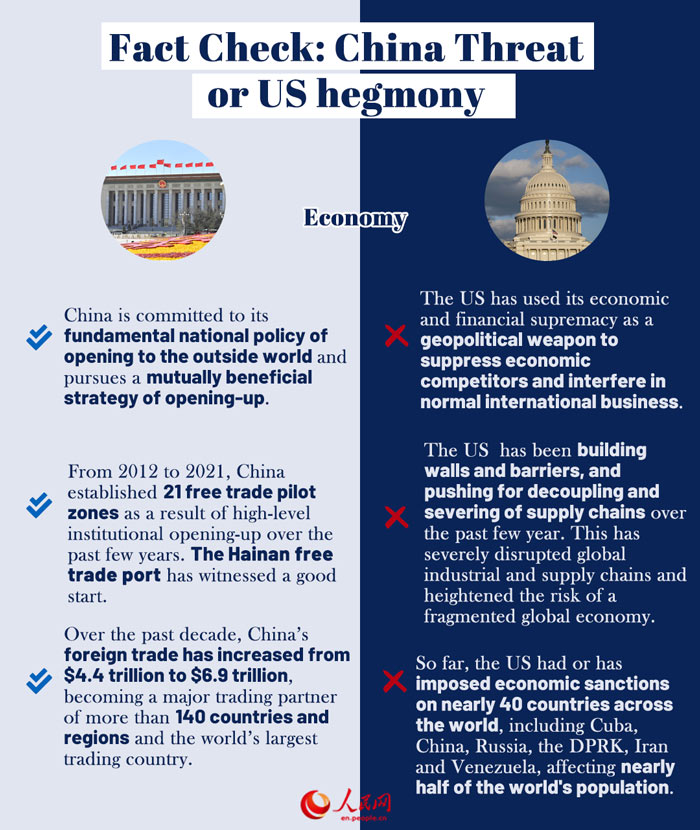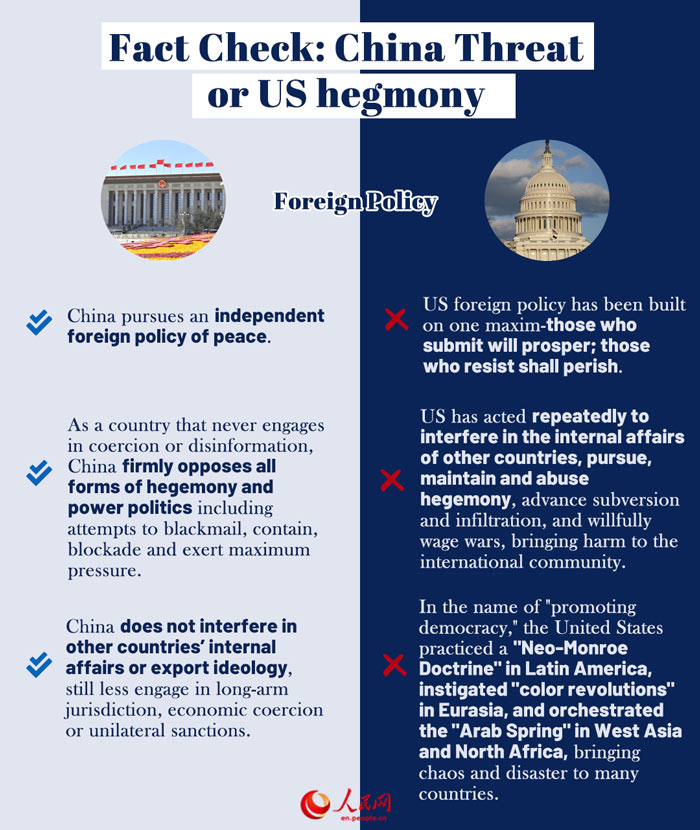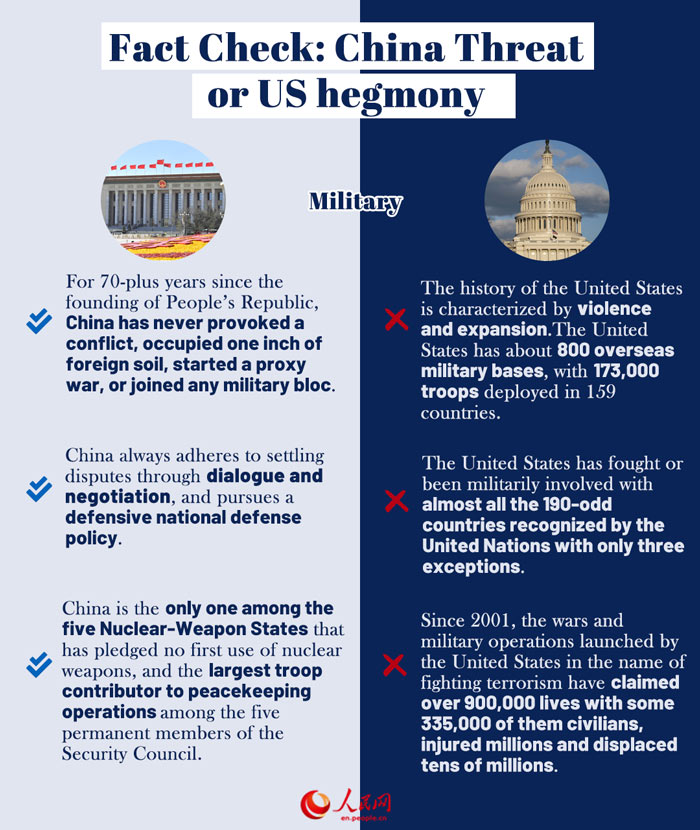The "China threat" idea has long been bandied about by US politicians trying to steal the spotlight from the media and the people. Will China become an actual threat to the world? Or by hyping up the "China threat", is the US simply finding an excuse to maintain its aggressive and hegemonic behavior? Here are facts that People's Daily Online has collected. Foreign Policy China is the only country in the world that has pledged to "keep to a path of peaceful development" in its Constitution. The country pursues an independent foreign policy of peace. It does not interfere in other countries' internal affairs or export ideology, still less engage in long-arm jurisdiction, economic coercion or unilateral sanction. As a country that never engages in coercion or disinformation, China firmly opposes all forms of hegemony and power politics including attempts to blackmail, contain, blockade and exert maximum pressure. China has always been a force for world peace, a contributor to global development, a defender of the international order, a provider of public goods and part of the mediation efforts on hotspot issues. In contrast, the US, the world's most powerful country after the two world wars and the Cold War, has acted repeatedly to interfere in the internal affairs of other countries, pursue, maintain and abuse hegemony, advance subversion and infiltration, and willfully wage wars, bringing harm to the international community. US foreign policy has been built on one maxim:those who submit will prosper; those who resist shall perish. Instances of U.S. interference in other countries' internal affairs abound. In the name of "promoting democracy," the United States practiced a "Neo-Monroe Doctrine" in Latin America, instigated "color revolutions" in Eurasia, and orchestrated the "Arab Spring" in West Asia and North Africa, bringing chaos and disaster to many countries. Military China has the best peace record among the world's major countries. China always adhere to settling disputes through dialogue and negotiation, and pursue a defensive national defense policy. For 70-plus years since the founding of People's Republic, China has never provoked a conflict, occupied one inch of foreign soil, started a proxy war, or joined any military bloc. China is the only one among the five Nuclear-Weapon States that has pledged no first use of nuclear weapons, and the largest troop contributor to peacekeeping operations among the five permanent members of the Security Council and the second largest contributor to UN peacekeeping assessments. No matter how much it develops, China will never seek hegemony, expansion or sphere of influence, nor engage in arms race, but remain a defender of world peace. On the other hand, the history of the United States is characterized by violence and expansion. After World War II, the wars either provoked or launched by the United States included the Korean War, the Vietnam War, the Gulf War, the Kosovo War, the War in Afghanistan, the Iraq War, the Libyan War and the Syrian War, abusing its military hegemony to pave the way for expansionist objectives. According to the book America Invades: How We've Invaded or been Militarily Involved with almost Every Country on Earth, the United States has fought or been militarily involved with almost all the 190-odd countries recognized by the United Nations with only three exceptions. The three countries were "spared" because the United States did not find them on the map. In recent years, the U.S. average annual military budget has exceeded 700 billion U.S. dollars, accounting for 40 percent of the world's total, more than the 15 countries behind it combined. The United States has about 800 overseas military bases, with 173,000 troops deployed in 159 countries. U.S. military hegemony has caused humanitarian tragedies. Since 2001, the wars and military operations launched by the United States in the name of fighting terrorism have claimed over 900,000 lives with some 335,000 of them civilians, injured millions and displaced tens of millions. The 2003 Iraq War resulted in some 200,000 to 250,000 civilian deaths, including over 16,000 directly killed by the U.S. military, and left more than a million homeless. Economy China is committed to its fundamental national policy of opening to the outside world and pursues a mutually beneficial strategy of opening-up, and strives to create new opportunities for the world with its own development and contribute its share to building an open global economy. Over the past decade (2012-2021), despite headwinds against economic globalization and rising unilateralism and protectionism in the world, China's foreign trade has increased from $4.4 trillion to $6.9 trillion, becoming a major trading partner of more than 140 countries and regions and the world’s largest trading country. China's annual FDI in actual use has hit 1.15 trillion yuan, up from 700 billion yuan, ranking second globally for five consecutive years since 2017. The capital stock of China's FDI abroad has soared from less than $0.6 trillion to over $2.7 trillion, ranking third in the world. Also, China has established 21 free trade pilot zones as a result of high-level institutional opening-up. The Hainan free trade port has witnessed a good start. The negative list for foreign investment in pilot free trade zones has been shortened by more than 85% from 190 items to 27. While the US has used its economic and financial supremacy as a geopolitical weapon to suppress economic competitors and interfere in normal international business. Over the past few years, the US has been building walls and barriers, and pushing for decoupling and severing of supply chains. This has severely disrupted global industrial and supply chains and heightened the risk of a fragmented global economy. The US is becoming a major factor threatening the stability and growth of the world economy. The IMF has stated in its recent report that even limited fragmentation could shave 0.2% off of global GDP while a severe fragmentation of the global economy could reduce global economic output by up to 7%. Doubling down on unilateral sanctions and "long-arm jurisdiction," the United States has enacted such domestic laws as the International Emergency Economic Powers Act, the Global Magnitsky Human Rights Accountability Act, and the Countering America's Adversaries Through Sanctions Act, and introduced a series of executive orders to sanction specific countries, organizations or individuals. So far, the United States had or has imposed economic sanctions on nearly 40 countries across the world, including Cuba, China, Russia, the DPRK, Iran and Venezuela, affecting nearly half of the world's population. This is a serious departure from the principles of liberal market economy that the United States has long boasted. In conclusion, the so-called "China threat" allegation is a farce of a thief crying "stop, thief" in which the US tries to blame an innocent country for what it is guilty of itself.
China's threat? Things to know about China's role in the world
Editor:谭婕倪
Source:en.people
Updated:2023-03-15 10:43:07
Source:en.people
Updated:2023-03-15 10:43:07
Special
Contact
Welcome to English Channel! Any suggestion, welcome.Tel:0731-82965627
lisl@rednet.cn
zhouqian@rednet.cn













